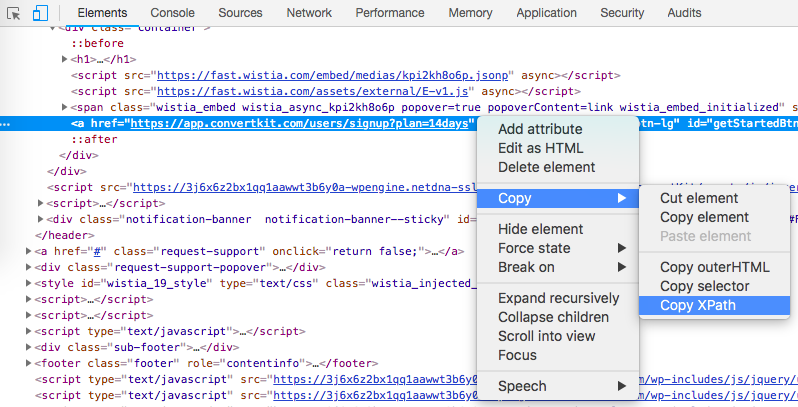Frequently Asked Questions¶
How is TagUI licensed?¶
TagUI is open-source software released under the Apache 2.0 license.
How do I find the XPath of a web element?¶
In Chrome, right-click on the element, click Inspect, right-click on the highlighted HTML, then:

For some web pages, the XPath of an element can change. To combat this, you can find a stable element in the web page and writing a custom XPath relative to that stable element.
XPath is very powerful and can allow you to select web elements in many ways. Learn more about XPath at w3schools.
How do I use the Command Prompt?¶
Hold the Windows key and press R. Then type cmd and press Enter to enter the Command Prompt.
From here, you can run a command by typing it and pressing Enter.
How do I use the Terminal?¶
Hold Command and press spacebar, then type Terminal and press Enter.
From here, you can run a command by typing it and pressing Enter.
How do I find the id, name, class or other attributes of a web element?¶
In Chrome, right-click on the element, click Inspect. There will be some highlighted HTML, like this:

This highlighted element has a class attribute of “chat-line__body”. It doesn’t have any id or name attribute.
How do I use the cutting edge version of TagUI?¶
Download the latest stable version at the installation page.
Unzip and overwrite the files in your
tagui/src/folder.
What are csv files?¶
CSV files are files which stores data in a table form. They can be opened with Microsoft Excel and Google Sheets.
Each line is a row of values. The values are split into different columns by commas ,, which is why CSV stands for Comma Separated Values.
Running flows on a fixed schedule¶
It is often useful to run flows automatically on a fixed schedule: monthly; weekly; daily or even every 5 minutes.
On Windows, use the Task Scheduler.
On macOS/Linux, use crontab.
Is TagUI safe to use?¶
As TagUI and the foundation it’s built on is open-source software, it means users can read the source code of TagUI and all its dependencies to check if there is a security flaw or malicious code. This is an advantage compared to using commercial software that is closed-source, as users cannot see what is the code behind the software.
Following are links to the source code for TagUI and its open-source dependencies. You can dig through the source code for the other open-source dependencies below, or make the fair assumption that security issues would have been spotted by users and fixed, as these projects are mature and have large user bases.
SikuliX - https://github.com/RaiMan/SikuliX1
CasperJS - https://github.com/casperjs/casperjs
PhantomJS - https://github.com/ariya/phantomjs
SlimerJS - https://github.com/laurentj/slimerjs
Python - https://github.com/python/cpython
Does TagUI track what I automate?¶
No. TagUI does not send outgoing web traffic or outgoing data, other than what the user is automating on, for example visiting a website.
Why doesn’t my visual automation work?¶
On macOS, it may be due to how the image was captured.
On Linux, you may need to set up dependencies.